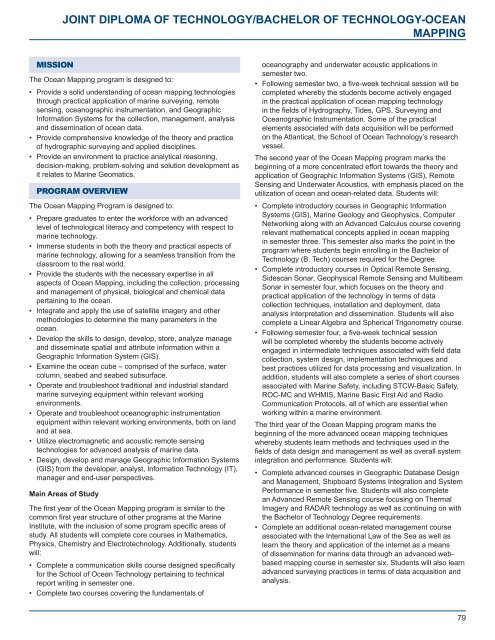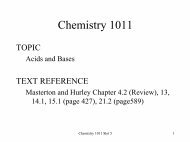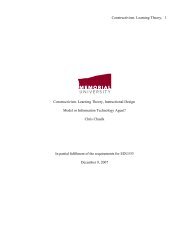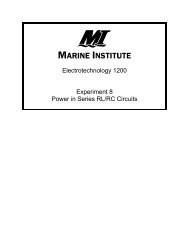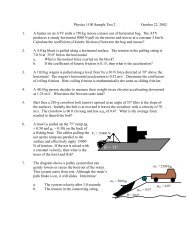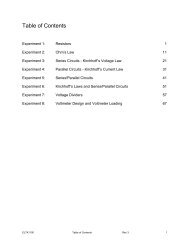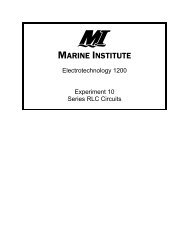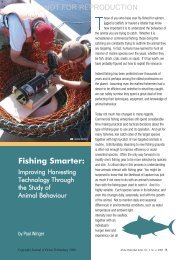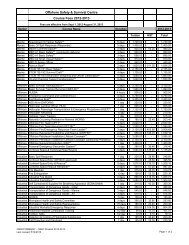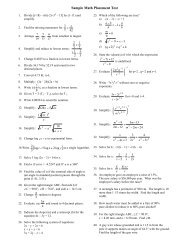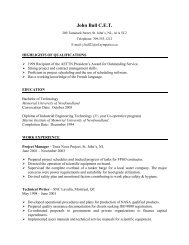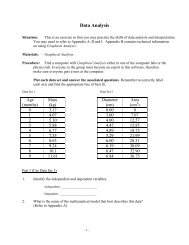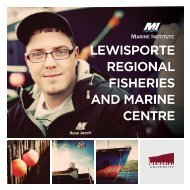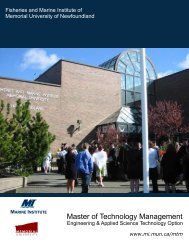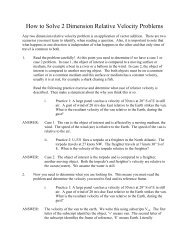Academic Calendar - Fisheries and Marine Institute - Memorial ...
Academic Calendar - Fisheries and Marine Institute - Memorial ...
Academic Calendar - Fisheries and Marine Institute - Memorial ...
Create successful ePaper yourself
Turn your PDF publications into a flip-book with our unique Google optimized e-Paper software.
JOINT DIPLOMA OF TECHNOLOGY/BACHELOR OF TECHNOLOGY-OCEAN<br />
MAPPING<br />
MISSION<br />
The Ocean Mapping program is designed to:<br />
• Provide a solid underst<strong>and</strong>ing of ocean mapping technologies<br />
through practical application of marine surveying, remote<br />
sensing, oceanographic instrumentation, <strong>and</strong> Geographic<br />
Information Systems for the collection, management, analysis<br />
<strong>and</strong> dissemination of ocean data.<br />
• Provide comprehensive knowledge of the theory <strong>and</strong> practice<br />
of hydrographic surveying <strong>and</strong> applied disciplines.<br />
• Provide an environment to practice analytical reasoning,<br />
decision-making, problem-solving <strong>and</strong> solution development as<br />
it relates to <strong>Marine</strong> Geomatics.<br />
PROGRAM OVERVIEW<br />
The Ocean Mapping Program is designed to:<br />
• Prepare graduates to enter the workforce with an advanced<br />
level of technological literacy <strong>and</strong> competency with respect to<br />
marine technology.<br />
• Immerse students in both the theory <strong>and</strong> practical aspects of<br />
marine technology, allowing for a seamless transition from the<br />
classroom to the real world.<br />
• Provide the students with the necessary expertise in all<br />
aspects of Ocean Mapping, including the collection, processing<br />
<strong>and</strong> management of physical, biological <strong>and</strong> chemical data<br />
pertaining to the ocean.<br />
• Integrate <strong>and</strong> apply the use of satellite imagery <strong>and</strong> other<br />
methodologies to determine the many parameters in the<br />
ocean.<br />
• Develop the skills to design, develop, store, analyze manage<br />
<strong>and</strong> disseminate spatial <strong>and</strong> attribute information within a<br />
Geographic Information System (GIS).<br />
• Examine the ocean cube – comprised of the surface, water<br />
column, seabed <strong>and</strong> seabed subsurface.<br />
• Operate <strong>and</strong> troubleshoot traditional <strong>and</strong> industrial st<strong>and</strong>ard<br />
marine surveying equipment within relevant working<br />
environments.<br />
• Operate <strong>and</strong> troubleshoot oceanographic instrumentation<br />
equipment within relevant working environments, both on l<strong>and</strong><br />
<strong>and</strong> at sea.<br />
• Utilize electromagnetic <strong>and</strong> acoustic remote sensing<br />
technologies for advanced analysis of marine data.<br />
• Design, develop <strong>and</strong> manage Geographic Information Systems<br />
(GIS) from the developer, analyst, Information Technology (IT),<br />
manager <strong>and</strong> end-user perspectives.<br />
Main Areas of Study<br />
The first year of the Ocean Mapping program is similar to the<br />
common first year structure of other programs at the <strong>Marine</strong><br />
<strong>Institute</strong>, with the inclusion of some program specific areas of<br />
study. All students will complete core courses in Mathematics,<br />
Physics, Chemistry <strong>and</strong> Electrotechnology. Additionally, students<br />
will:<br />
• Complete a communication skills course designed specifically<br />
for the School of Ocean Technology pertaining to technical<br />
report writing in semester one.<br />
• Complete two courses covering the fundamentals of<br />
oceanography <strong>and</strong> underwater acoustic applications in<br />
semester two.<br />
• Following semester two, a five-week technical session will be<br />
completed whereby the students become actively engaged<br />
in the practical application of ocean mapping technology<br />
in the fields of Hydrography, Tides, GPS, Surveying <strong>and</strong><br />
Oceanographic Instrumentation. Some of the practical<br />
elements associated with data acquisition will be performed<br />
on the Atlanticat, the School of Ocean Technology’s research<br />
vessel.<br />
The second year of the Ocean Mapping program marks the<br />
beginning of a more concentrated effort towards the theory <strong>and</strong><br />
application of Geographic Information Systems (GIS), Remote<br />
Sensing <strong>and</strong> Underwater Acoustics, with emphasis placed on the<br />
utilization of ocean <strong>and</strong> ocean-related data. Students will:<br />
• Complete introductory courses in Geographic Information<br />
Systems (GIS), <strong>Marine</strong> Geology <strong>and</strong> Geophysics, Computer<br />
Networking along with an Advanced Calculus course covering<br />
relevant mathematical concepts applied in ocean mapping<br />
in semester three. This semester also marks the point in the<br />
program where students begin enrolling in the Bachelor of<br />
Technology (B. Tech) courses required for the Degree.<br />
• Complete introductory courses in Optical Remote Sensing,<br />
Sidescan Sonar, Geophysical Remote Sensing <strong>and</strong> Multibeam<br />
Sonar in semester four, which focuses on the theory <strong>and</strong><br />
practical application of the technology in terms of data<br />
collection techniques, installation <strong>and</strong> deployment, data<br />
analysis interpretation <strong>and</strong> dissemination. Students will also<br />
complete a Linear Algebra <strong>and</strong> Spherical Trigonometry course.<br />
• Following semester four, a five-week technical session<br />
will be completed whereby the students become actively<br />
engaged in intermediate techniques associated with field data<br />
collection, system design, implementation techniques <strong>and</strong><br />
best practices utilized for data processing <strong>and</strong> visualization. In<br />
addition, students will also complete a series of short courses<br />
associated with <strong>Marine</strong> Safety, including STCW-Basic Safety,<br />
ROC-MC <strong>and</strong> WHMIS, <strong>Marine</strong> Basic First Aid <strong>and</strong> Radio<br />
Communication Protocols, all of which are essential when<br />
working within a marine environment.<br />
The third year of the Ocean Mapping program marks the<br />
beginning of the more advanced ocean mapping techniques<br />
whereby students learn methods <strong>and</strong> techniques used in the<br />
fields of data design <strong>and</strong> management as well as overall system<br />
integration <strong>and</strong> performance. Students will:<br />
• Complete advanced courses in Geographic Database Design<br />
<strong>and</strong> Management, Shipboard Systems Integration <strong>and</strong> System<br />
Performance in semester five. Students will also complete<br />
an Advanced Remote Sensing course focusing on Thermal<br />
Imagery <strong>and</strong> RADAR technology as well as continuing on with<br />
the Bachelor of Technology Degree requirements.<br />
• Complete an additional ocean-related management course<br />
associated with the International Law of the Sea as well as<br />
learn the theory <strong>and</strong> application of the internet as a means<br />
of dissemination for marine data through an advanced webbased<br />
mapping course in semester six. Students will also learn<br />
advanced surveying practices in terms of data acquisition <strong>and</strong><br />
analysis.<br />
79


